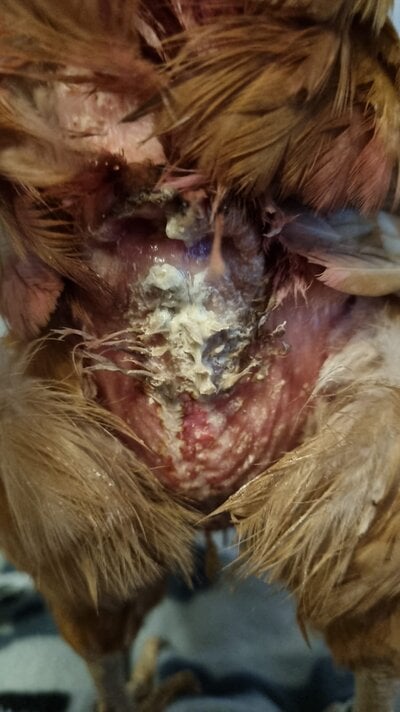FaithArthur123999
Chirping
- Jun 13, 2022
- 125
- 181
- 93
Hello again, still clogging up this forum
My poor Babs has now had Vent Gleet for 7 days (I believe its vent gleet). She is constantly dripping a white paste (slight tinge of yellow) and clear liquid all day. I have to clean her vent morning and night and have been applying canestan on everytime. Shes been isolated from the flock but I am now getting very worried about the reintroduction as her healing is taking so long. 7 days ago she had a prolapse that was pecked by the other girls and was seen by vet straight away, the white liquid in vent started later that evening. There was a suspected worms/coccidiosis outbreak in the flock so they are all on treatment for that and ends tomorrow. Babs had been on antibiotics for 7 days due to the wounds around her vent, I dont know if this is the cause of her vent gleet not getting better. I have tried mixing apple cidar vinagar in natural yogurt everyday but cant give her much else due to the coxoid and flubevent. She seems very well in her self and is running around fine. She is also on anti inflammatory. The antibiotics and anti Inflammatorys end tomorrow morning. I will also be giving them 'Beryls friendly bacteria' tomorrow too.
Should I give it a few more days with some probiotics and more yogurt etc or should I seek a vets appointment? Shes cost me alot this month so trying to avoid vets as much as possible but if she needs to go then I will take her.
Any advice would be appreciated. I am worried about her. Thanks xx
My poor Babs has now had Vent Gleet for 7 days (I believe its vent gleet). She is constantly dripping a white paste (slight tinge of yellow) and clear liquid all day. I have to clean her vent morning and night and have been applying canestan on everytime. Shes been isolated from the flock but I am now getting very worried about the reintroduction as her healing is taking so long. 7 days ago she had a prolapse that was pecked by the other girls and was seen by vet straight away, the white liquid in vent started later that evening. There was a suspected worms/coccidiosis outbreak in the flock so they are all on treatment for that and ends tomorrow. Babs had been on antibiotics for 7 days due to the wounds around her vent, I dont know if this is the cause of her vent gleet not getting better. I have tried mixing apple cidar vinagar in natural yogurt everyday but cant give her much else due to the coxoid and flubevent. She seems very well in her self and is running around fine. She is also on anti inflammatory. The antibiotics and anti Inflammatorys end tomorrow morning. I will also be giving them 'Beryls friendly bacteria' tomorrow too.
Should I give it a few more days with some probiotics and more yogurt etc or should I seek a vets appointment? Shes cost me alot this month so trying to avoid vets as much as possible but if she needs to go then I will take her.
Any advice would be appreciated. I am worried about her. Thanks xx




